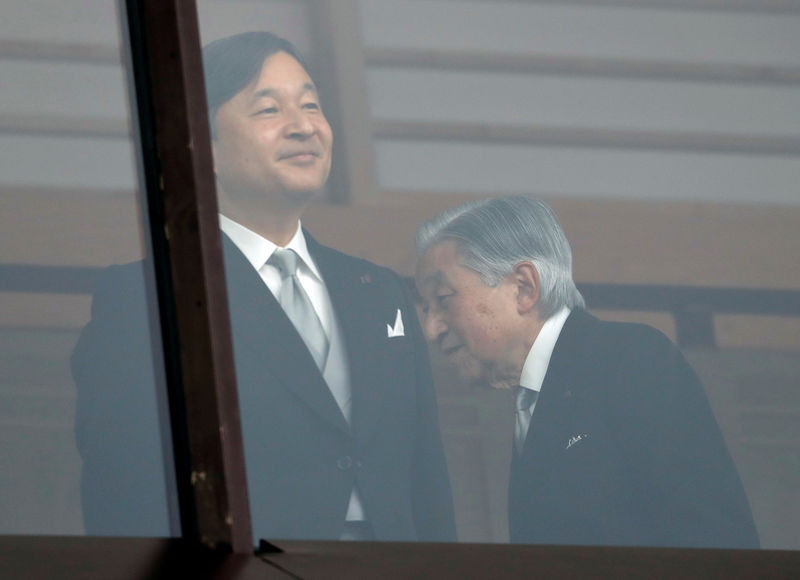 © Reuters. Japan’s Emperor Akihito walks behind Crown Prince Naruhito after greeting well-wishers who gathered at the Imperial Palace to mark Emepror’s 85th birthday in Tokyo
© Reuters. Japan’s Emperor Akihito walks behind Crown Prince Naruhito after greeting well-wishers who gathered at the Imperial Palace to mark Emepror’s 85th birthday in TokyoBy Hideyuki Sano and Tomo Uetake
TOKYO (Reuters) – To mark the ascension of Japan’s new emperor, the government has declared an unprecedented 10-day holiday from late April to early May, worrying investors, who say a market shutdown could cause disruption and unsettle the yen.
Japan usually has a string of public holidays from late April to early May, the so-called the “Golden Week.”
But this year, with Crown Prince Naruhito’s being crowned the new emperor on May 1, the government made the entire period from April 27 to May 6 a market holiday.
It will be the longest break ever for Japanese stocks and bonds.
Major financial centers rarely have such long periods of shutdown. U.S. financial markets closed for six days after the attacks on Sept. 11, 2001.
“It’s horrifying that we can’t trade for six business days. We’ve got to adjust our positions before the week. Hard to say exactly what I will do then, but I’ll probably have to make my position neutral before the holidays,” said Yasuo Sakuma, chief investment officer at Libra Investments.
Japan’s financial watchdog has told all financial institutions to alert customers about the possibility of turbulence in overseas markets during the shutdown, and to make sure their systems can cope with a flurry of activity before and after, documents obtained by Reuters showed.
The U.S. and UK central banks will hold policy meetings during the Japanese holiday; U.S. payroll data, GDP from the United States and the Eurozone, and corporate earnings around the world will also be released.
“In 10 days, we can be in a completely different world,” said a currency trader at a major Japanese bank.
Currency traders at the country’s biggest banks and insurers, such as MUFG Bank, Sumitomo Mitsui Bank, Mizuho Bank and Nippon Life Insurance, are equipped to work either at home or in the office during holidays, markets players say.
But they added it might be tougher to deal with more complex products, such as derivatives, pricing of which usually requires in-house terminals.
Fund managers, meanwhile, say they will probably need to bring their positions to neutral by late April to avoid exposure to market swings.
YEN FLUCTUATIONS
The break also could disrupt currency trading.
Speculators with a bullish view on the yen could take advantage of the long holiday to push up the yen, traders say.
The yen has strengthened against the dollar since early October on rising concerns about a global economic slowdown and the U.S.-China trade war.
“You can move the market more easily because of low market liquidity. So those who want to move market prices, like hedge funds, will likely do so during this holiday. Therefore, the most important point is that you have to be prepared for the risk of the yen’s rise,” said Kyoya Okazawa, Asia-Pacific head of institutional clients at BNP Paribas (PA:).
Japanese stocks will be more volatile after the holiday, he added.
“Let’s say the dollar falls from 100 yen to 90 yen during the holiday. Where should the be after that? No one can tell exactly. It’s when no one has a clear idea that markets crash,” he said.
Okazawa also expects many investors will hedge such risk by buying options on dollar/yen and Japanese stocks, giving them rights, but not obligations, to trade.
“In 10 days, anything could happen. But it could go either way so you can’t afford to be out of the market,” said Bill Maldonado, global chief investment officer for equities at HSBC Global Asset Management.
Source: Investing.com




























